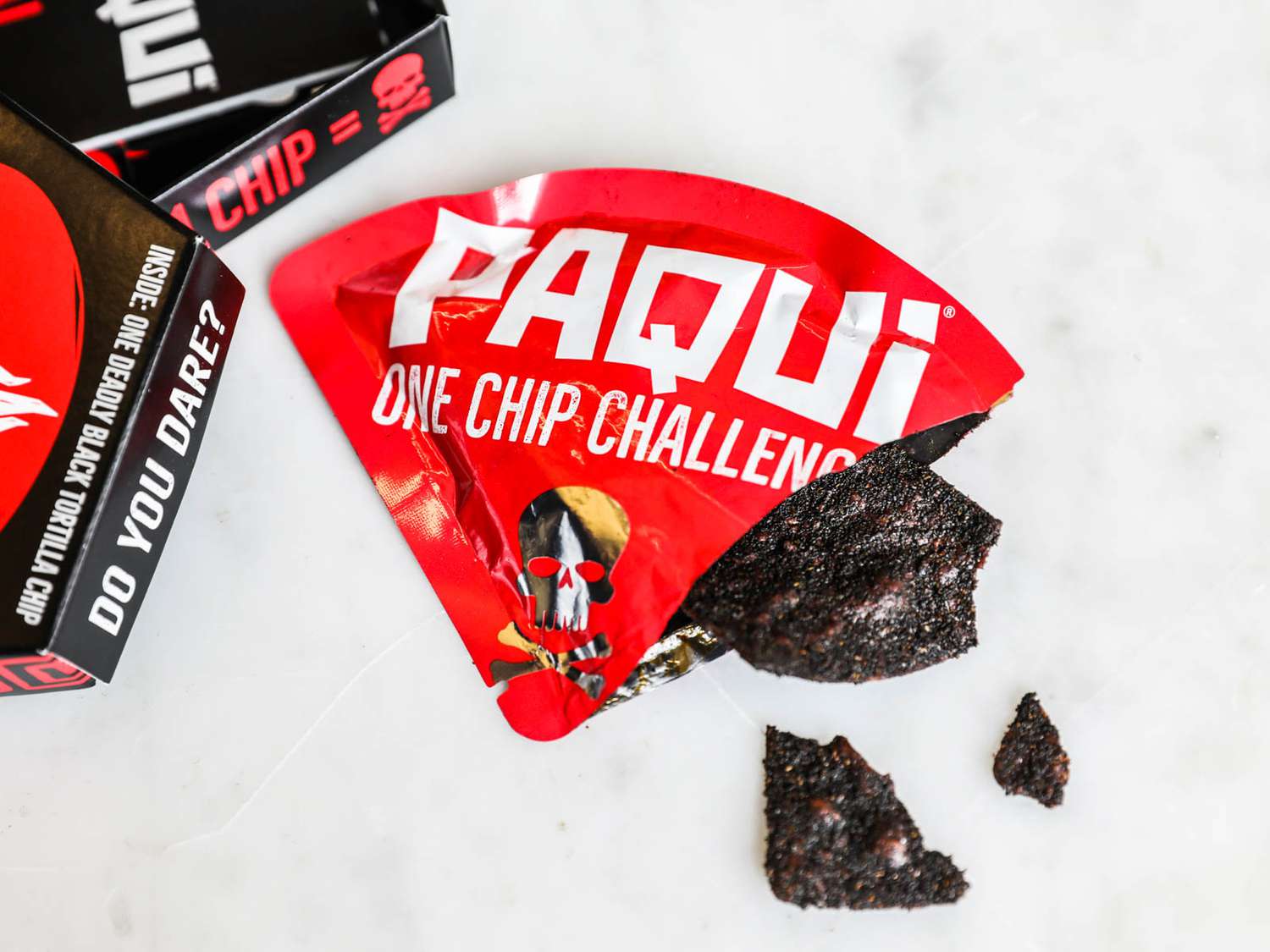Spicy chips, with their fiery kick and addictive crunch, have become a favorite snack among many young people. However, while these tantalizing treats can satisfy taste buds, they often come laden with sodium, saturated fats, and artificial additives. These ingredients, especially when consumed in excess, are not conducive to a healthy diet and can lead to various health concerns.
Despite the potential drawbacks, the allure of spicy chips is undeniable, especially among the youth, who often prioritize flavor over nutritional content. Balancing enjoyment with health considerations remains challenging in this age of flavorful processed snacks.

Like most commercial snack foods, spicy chips are typically produced using various steps involving various ingredients and processes. Here’s an overview of how spicy chips are cooked and the potential reasons they can be considered unhealthy:
Cooking Process:
- Potato Preparation: Potatoes are peeled, washed, and sliced into thin pieces to get the desired chip thickness.
- Frying:
- The sliced potatoes are then fried in oil. The type of oil used varies but can include palm oil, sunflower oil, or canola oil, among others.
- This frying process gives the chips their crispy texture but can also introduce a significant amount of fat, mainly if the chips are not appropriately drained.
- Flavoring:
- After frying, while still hot, the chips are tossed with flavoring agents. Spicy chips can include powdered chili peppers, paprika, and other spices.
- Salt, MSG (monosodium glutamate), or other flavor enhancers may be added to intensify the taste.
Health Concerns:
- High Sodium Content:
- Spicy chips can be high in sodium, especially if salt is a primary ingredient in the flavoring mix. Excessive sodium consumption is linked to hypertension (high blood pressure), a risk factor for heart disease and stroke.
- Saturated and Trans Fats:
- The type of oil used for frying and its quality can determine the fat content of the chips. Oils rich in saturated fats or those used repeatedly can increase the saturated and trans fat content in the chips. Both saturated and trans fats have been linked to increased LDL (bad) cholesterol, which can contribute to heart disease.
- Caloric Density:
- Due to the frying process, chips are calorically dense, meaning they provide a lot of calories in a small volume. This can contribute to overeating and subsequent weight gain.
- Artificial Additives:
- Some spicy chips may contain artificial flavors, colors, or preservatives. These additives might pose health risks if consumed in large amounts over time.
- Acrylamide Formation:
- Acrylamide is a chemical that can form in certain foods, including potato products, during high-temperature cooking processes like frying. Studies have linked acrylamide to an increased cancer risk, although more research is needed.
- Digestive Concerns:
- The capsaicin in spicy flavorings can irritate the digestive system, leading to heartburn, acid reflux, and even gastritis in sensitive individuals.
- Low Nutrient Density:
- Compared to whole foods, spicy chips often offer little nutritional value. They lack essential vitamins, minerals, and fiber that one would find in unprocessed or minimally processed foods.
Are Spicy Chips Bad For You?
Yes, spicy chips are bad for you because of health concerns due to capsaicin, which can irritate the stomach lining, leading to issues like acid reflux and gastritis. Additionally, many spicy chips are high in sodium and saturated fats, which can contribute to cardiovascular diseases. The intense heat can cause oral discomfort, adverse physiological reactions, and choking hazards.
The “One Chip Challenge” image below shows that spicy chips can be dangerous. Please read how Spicy the “One Chip Challenge” is.

Touching these chips and then sensitive body parts can cause irritation, and the addictive nature of the endorphin rush they provide may lead to overconsumption, exacerbating these health risks.
Spicy chips can pose particular health concerns for people. Here’s a breakdown of why they might be considered flawed:
- Digestive Issues: Capsaicin, the primary compound responsible for chili peppers’ spiciness, can irritate the stomach lining, leading to stomach cramps, acid reflux, and indigestion. This can exacerbate gastritis or ulcer conditions for some, especially those with sensitive digestive systems.
- Oral Discomfort: Consuming very spicy chips can cause a burning sensation in the mouth. This can lead to swelling of the lips or even the formation of blisters in severe cases.
- Adverse Physiological Reactions: Some individuals may experience sweating, dizziness, and even shortness of breath after consuming spicy chips.
- Overconsumption of Salt: Many spicy chips also contain high amounts of salt. Excessive sodium intake is linked to high blood pressure, increased risk of stroke, and other cardiovascular diseases.
- Unhealthy Ingredients: Some spicy chips can contain harmful fats, artificial flavors, and preservatives, which, when consumed regularly, can contribute to various health issues, including weight gain and heart diseases.
- Potential Choking Hazard: The intense spiciness can sometimes cause individuals to cough, increasing the risk of choking, especially if they’re not careful.
- Interference with Medications: Capsaicin can interfere with certain medications. For instance, it might increase stomach acid, reducing the effectiveness of drugs to reduce acid production.
- Eye and Skin Irritation: Touching spicy chips and the eyes, nose, or other sensitive areas can cause irritation. Capsaicin can be transferred from the fingers and cause burning sensations.
- Addictive Nature: For some, the endorphin rush from eating spicy foods can be addictive, leading them to overconsume such chips, thereby increasing the potential for adverse health effects.
- Heartburn: Capsaicin can relax the lower esophageal sphincter, the muscle that keeps stomach acid from flowing back into the esophagus, leading to heartburn or acid reflux.
While many people enjoy spicy chips without any adverse effects, it’s essential to consume them in moderation and be aware of any personal sensitivities to capsaicin or other ingredients.
High sodium and saturated fat levels in spicy chips
Consuming spicy chips high in sodium and saturated fats can pose health risks. Excessive sodium intake can lead to the body retaining more water, resulting in elevated blood pressure, a key risk factor for heart disease and stroke.
- Spicy chips high in sodium can increase blood pressure.
- Elevated sodium intake heightens the risk of heart disease and stroke.
- Too much sodium strains the kidneys.
- High sodium can contribute to osteoporosis.
- Saturated fats in chips raise LDL cholesterol.
- Elevated LDL cholesterol is linked to heart disease.
Over time, too much sodium can strain the kidneys, impairing their function and increasing the risk of chronic heart conditions. Moreover, high sodium consumption might contribute to osteoporosis due to calcium loss in urine. On the other hand, the saturated fats in these chips can raise LDL (low-density lipoprotein) cholesterol levels in the blood, which is associated with an increased risk of heart disease.
Spicy Chips and Digestive Issues
Spicy chips can lead to various digestive issues due to their specific ingredients and the body’s response to them. Here’s a detailed breakdown of how spicy chips can affect the digestive system:
- Capsaicin:
- Capsaicin is the compound responsible for the spicy sensation in chili peppers and, subsequently, in spicy chips. Consuming can lead to a burning sensation on the tongue as it moves through the digestive tract.
- The body responds to capsaicin as a foreign, potentially harmful substance. As a result, the stomach may increase mucus production to protect its lining. Over time, however, excessive consumption of capsaicin can decrease this protective barrier, increasing the risk of gastritis or even ulcers.
- Acid Production:
- Spicy foods, including spicy chips, can stimulate the stomach cells to produce more acid. This increased acid production can cause discomfort and potentially lead to conditions like acid reflux or heartburn.
- Digestive Speed:
- For some people, spicy foods can either slow down the transit time in the intestines or speed it up. This can lead to constipation or diarrhea, respectively.
- Sodium and Fats:
- Spicy chips often have a high sodium content, which can lead to water retention and bloating. The salt draws water into the intestines, exacerbating feelings of bloating.
- High levels of saturated fats, often in chips, can be challenging for some people to digest, leading to nausea or stomach cramps.
- Intestinal Irritation:
- The spicy components of the chips can irritate the intestines. This irritation can increase bowel movements and diarrhea, especially in individuals sensitive to spicy foods.
- Rectal Burning:
- Capsaicin isn’t broken down entirely in the body. When the remnants are excreted, it can cause a burning sensation during bowel movements.
It’s worth noting that everyone’s tolerance to spicy foods varies. While some people can consume spicy chips without issues, others may experience severe digestive discomfort from even a tiny amount. Moderation and understanding one’s tolerance level are essential.
Conclusion
If we calculate all the positive and negative impacts of spice chips, I consider them unhealthy food.
With their enticing flavors, spicy chips have carved a niche in the snack market, especially among the younger generation. However, the health implications of their high sodium, saturated fat, and artificial ingredient content cannot be overlooked.
Regular and excessive consumption can lead to numerous health concerns, ranging from digestive issues to long-term cardiovascular problems. While they can be enjoyed in moderation, knowing their nutritional profile is crucial. As consumers, making informed choices and prioritizing health alongside taste is essential.
- How Many Tablespoons is One Clove of Garlic? - June 26, 2024
- How to Measure 3/4 Cup When You Don’t Have the Right Measuring Cup? - June 6, 2024
- How Much Does Cooked Pasta Weight Compare To Dry? - April 30, 2024
